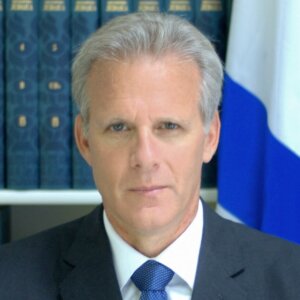In three funerals, the real spirit of Israel is exemplified

Israeli police officers carry the coffin of police officer Amir Khoury, who was killed in a terrorist shooting attack in Bnei Brak, during his funeral in Nazareth, on March 31, 2022. By Jalaa Marey/AFP via Getty Images
During my years in public office, I attended many shivas for fallen soldiers of Israel. Each of them was emotionally draining. One, though, left an especially profound impression.
Hadas Malka, a police officer, was stabbed to death outside Jerusalem’s Damascus Gate in 2017. She had refused to accept a safe desk job in the Israeli Defense Forces, insisting on serving in the border police, better known by its Hebrew acronym, Magav.
Her father David, determined to preserve her legacy, established the Hadas Malka Memorial Foundation to assist border police and other combat soldiers from disadvantaged backgrounds.
David asked me to serve as its chair, and to accompany him on a visit to newly bereaved families. During this visit, I experienced the real Israel that so few get to see up close.
The shiva for 19-year-old Shirel Aboukrat in Netanya, a coastal city home to thousands of new immigrants from France, was our first stop. Originally from North Africa and highly traditional, Shirel’s family was joined by many relatives who flew in for the funeral. French and Hebrew mixed in hushed tones around the grieving parents as people lined up to comfort them.
“We fled France to have security and here she died, in our country,” Shirel’s mother told the press. “It does not make sense.”
From the mourners, we heard about the young woman who dreamed of someday marrying and raising a family, but first wanted to defend her country. Like Hadas Malka, Shirel rejected desk jobs and insisted on joining Magav. She was barely six months into her service when she was killed in a terror attack.
Coincidentally, I had attended her graduation ceremony — the daughter of an immigrant friend of mine was also graduating — and was astonished by the great diversity of her class. Along with a large number of young people from the Ethiopian community were Bedouin from the south, Druze from the north and a Muslim man, a father of three who, at age 40, decided to join the police.
The parents, many in traditional garb, seemed to be deeply moved. Magav is a mirror of Israel’s kaleidoscopic society. Men and women serve in equal capacities, as do both religious and secular Jews, Christians, Muslims and Druze. The training is gruelling and increased violence in the territories, combined with an increase in media interest, has only increased Magav’s popularity. Rather than depleting its ranks, the dangers faced by Magav have made it increasingly selective, with seven to eight new recruits competing for each open space in the unit. Shirel Aboukrat was one of them who successfully gained a position, as was her classmate, Yazan Falah, who was killed in the same attack.
They could not have come from a more different backgrounds. Yazan grew up in the picturesque village of Kisra-Sumei in the Upper Galilee. Like many Druze families, his boasted of many high-ranking IDF and police officials. As an only son, though, Yazan was exempted from combat service. Yet he, too, insisted on serving in Magav.
In contrast to Jewish shivas during which the bereaved families sit, Druze mourners rise to receive visitors and offer them bittersweet coffee and tea. Nevertheless, the memorials for Shirel and Yazan were movingly similar. Both were attended by Israelis from around the country, political and social leaders as well as average citizens who came to pay their respects and express gratitude.
And the message they heard was identical as well. “We have one response to terror,” Yazan’s uncle told me. “We love this country and will continue to defend it no matter what. The terrorists are all about death,” he said, “But even after this, we cherish life.”
From Kisra-Sumei, David and I descended to Nof HaGalil, near Nazareth, and the home of the Khoury family. First Sergeant Amir Khoury, 32, was killed in an attack in the ultra-Orthodox city of B’nai Barak in which four civilians were also murdered. Speeding toward the terrorist on his motorcycle, Amir shielded his partner’s body with his own and received the wounds that soon proved fatal. “You are a true hero,” his fiance, Shani, cried at the funeral.
All of Israel agreed, including the hundreds of Ultra-Orthodox Jews who came on rented buses with banners declaring, “Amir Khoury Hero of Israel,” and participated in a Greek Orthodox funeral replete with Christian symbols. Plans are already underway to name a street after the slain officer in a downtown Haredi neighborhood.
In the mourning tent set up outside the Khoury home, under furling Israeli flags, we sat with Arab and Jewish residents of Upper Nazareth, along with two Orthodox rabbis from New York.
I listened to Amir’s father, Jeries, who himself had a distinguished police career, talk about the values he instilled in his son — love of country, commitment to community. “He was at pistol practice and not even supposed to be on duty that night,” he related to us. “Hearing the report of the terrorist attack, he rushed to be the first on the scene.”
This was the Israel that David and I encountered during our day of condolence-calls. It was the Israel that I’d witnessed at so many shivas in the past — a country not of hatreds and conflict but of brotherhood, compassion and love.
Despite their religious and ethnic differences, the three bereaved families were united by a commitment to their state and a devotion to its defense. Their loss was shared by all.
I only wish that such solidarity would be revealed not only in times of tragedy, and that the world could see this Israel — the real one.
To contact the author, email [email protected].















